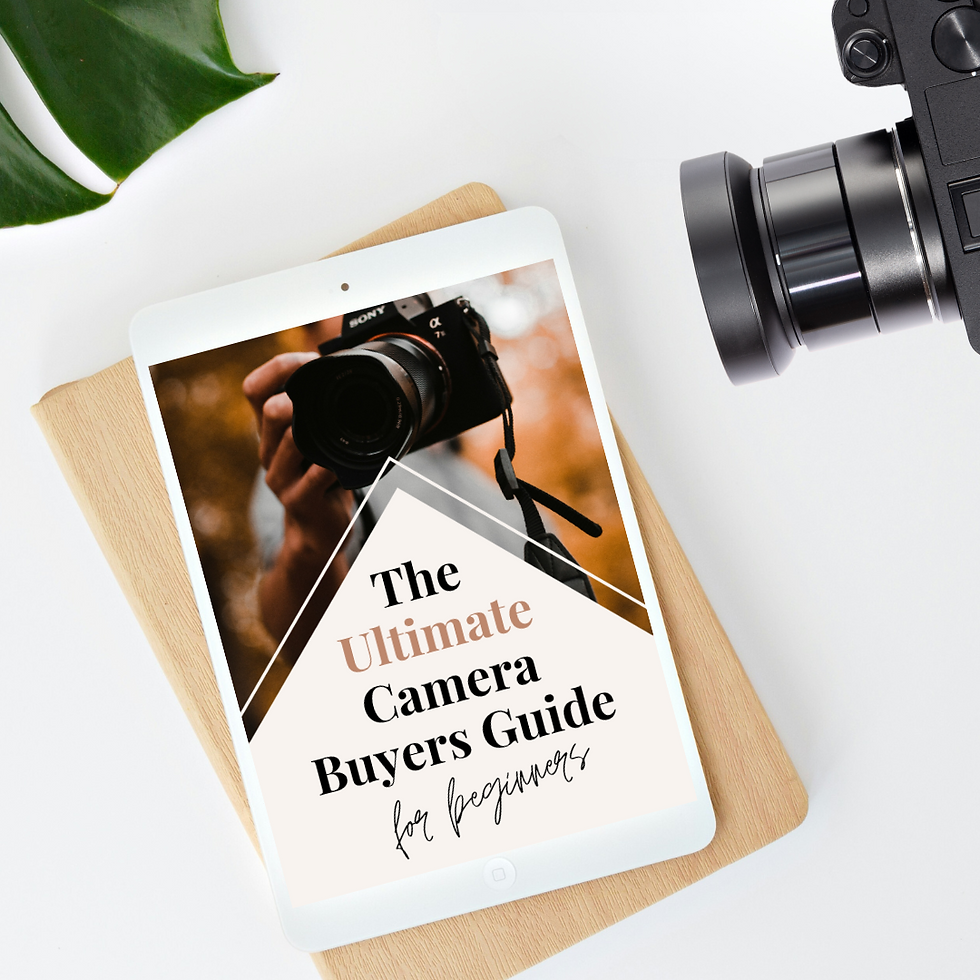The 3-Step Plan to Choosing Your First Beginner Camera
- Sarah Lester

- Oct 1, 2025
- 4 min read

You love taking pictures with your phone and now you’re ready to step things up with your first “proper” camera. That’s so exciting! But I also know it can feel a little overwhelming.
Walk into a camera shop or search online, and suddenly you’re hit with confusing specs, endless choices, and price tags that can make your head spin.
But where do you even start to pick the right beginner camera?
The good news is, buying your first camera doesn’t have to be complicated. I’ve helped countless beginners choose the right camera for them, and I can tell you this: the best beginner camera isn’t necessarily the most expensive, it’s the one that fits you. One that fits:
Your budget
Your needs, and
Your goals.
Here’s my simple 3-step plan to help you find your perfect beginner camera:

Step 1: Start With Your Budget
I know how tempting it can be to think that the more expensive the camera, the better your photos will be.
I’ve seen so many beginners rush out and buy the fanciest model they can afford, only to feel frustrated and overwhelmed when the photos don’t magically improve.
The truth is, it’s not the camera that makes the difference, it’s the person behind it. Even the most modest beginner DSLR or mirrorless camera has everything you need to start creating beautiful images.
Take one of my students, for example. She started with a second-hand entry-level camera that cost under £400. She felt nervous at first, thinking it wouldn’t be “good enough.” But after a few weeks of learning and practice, she was producing photos she never thought she was capable of. The camera wasn’t holding her back at all, it was simply about learning to use it.
So instead of stressing over megapixels and features, start with something simple and within your budget. Entry-level cameras usually fall in the £300–£800 range, and mid-range models can stretch up to £1000.
Don’t forget the second-hand market either, there are brilliant deals on nearly-new cameras that will serve you just as well as brand new.
Your job right now isn’t to buy the “perfect” camera. It’s to get a camera that feels manageable, start using it, and learn the basics with confidence. Once you’ve built that foundation, upgrading later will feel exciting, not overwhelming.
Step 2: Ask Yourself the Right Questions
This is where a lot of beginners get stuck. Instead of drowning in specs, think about how you’ll actually use your camera. Keep it simple - you don't need all of the features. You just need the features that are important to you:
What will you photograph most? If it’s kids running around or sports, you’ll want fast autofocus.
Do you want to shoot video too? If yes, check for good video quality (but don’t panic about 4K unless you’re serious about video).
Is size important? If you want something compact for travel or everyday use, a mirrorless camera might be the way to go.
Do you want flexibility with angles? An articulating touchscreen makes selfies and creative angles much easier.
Try not to worry too much about image quality or megapixels. The truth is, every modern beginner camera will produce fantastic results. All of the cameras I recommend are more than capable of giving you the sharp, high-quality photos you want.
Once you stop stressing over the numbers and focus on what really matters to you. Focus on how you’ll use the camera and what features will support your style. Then the decision suddenly feels much simpler.
Step 3: Try Before You Buy
After years of using film, choosing my first digital camera was a bit terrifying. I remember it well, it was about 20 years ago, and the choices were overwhelming. Everything seemed complicated, confusing and new. Even for an experienced photographer!
Then I went into a camera shop, and suddenly it made more sense.
Holding the cameras in my hands helped me feel what worked for me. Some felt bulky, others light and easy to handle. Buttons and dials that looked fine online could feel awkward in real life. The camera I chose simply felt comfortable and enjoyable to use, and that made all the difference.
If you can, visit a store and try a few cameras. Grip the body, press the buttons, and see what feels natural.
Your ideal beginner camera isn’t the most expensive or feature-packed, it’s the one that makes you want to pick it up and start taking photos.

Ready to Choose With Confidence?
This 3-step plan is just the beginning. In my Beginner Camera Buyers Guide (free download), I break down the specific camera models I recommend, explain what features are worth paying attention to (and which ones aren’t), and share my best tips for getting more value for your money.
With the right camera in your hands, you’ll be ready to stop overthinking and start creating.

Sarah is a professional photographer with over 20 years of experience.
She specialises in helping beginners build confidence with their cameras in a simple, easy-to-understand way.
Her Get Camera Confidence course has helped more than 1,000 students start taking photos they’re proud of.
Comments